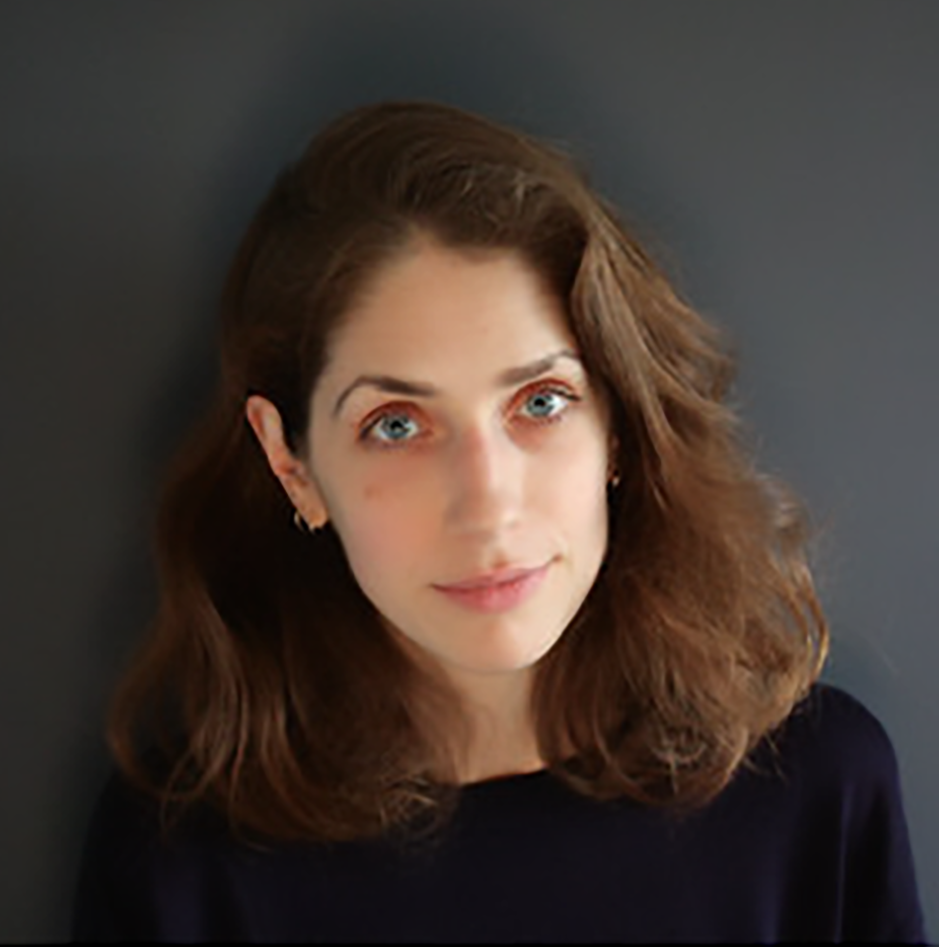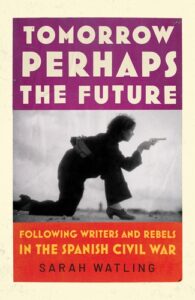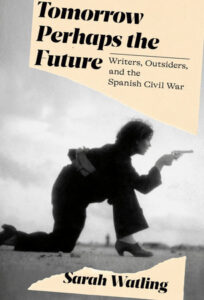Sarah Watling, author of Tomorrow Perhaps the Future: “Orwell and Hemingway Are Not the Whole Story.”
 Sarah Watling is an award-winning author who recently published Tomorrow Perhaps the Future, in which she weaves together the stories of women whose lives were affected by the Spanish Civil War, including Martha Gellhorn, Josephine Herbst, Sylvia Townsend Warner, Valentine Ackland, Jessica Mitford, Nancy Cunard, Virginia Woolf, Salaria Kea, and Gerda Taro.
Sarah Watling is an award-winning author who recently published Tomorrow Perhaps the Future, in which she weaves together the stories of women whose lives were affected by the Spanish Civil War, including Martha Gellhorn, Josephine Herbst, Sylvia Townsend Warner, Valentine Ackland, Jessica Mitford, Nancy Cunard, Virginia Woolf, Salaria Kea, and Gerda Taro.
Your first book, The Olivier Sisters, is a group biography of the late Victorian era. What drew you to the Spanish Civil War?
I’d been interested in the 1930s and the Spanish Civil War for a long time, but I didn’t start to think I had a subject for a book until I came across Authors Take Sides on the Spanish War, a pamphlet organized by Nancy Cunard in 1937. It was Cunard’s way of framing the issue that really struck me: “Now, as certainly never before, we are determined or compelled to take sides.” I wondered how you would justify a statement like that and what “taking sides” meant in practice for people facing up to the most pressing issues of their day. The pamphlet also raises the question of why authors in particular should have a responsibility—or right—to assume a position on a war in a foreign country. It’s a product of a moment I was interested to explore: a period during the rise of fascism, and a period when many British writers were attracted by Communism, in which writers and journalists began to rethink the purpose of their work and reconsider their responsibilities as artists.
 The fact that my subjects are all foreigners to Spain is significant: I wanted to explore the position of the “outsider” in particular. Partly because my subjects’ foreignness to Spain complicated their attempts to show solidarity with the Republic and partly because I thought their “outsiderdom” made visible a position they would have recognized, or claimed, as writers. Writing can be a solitary and deeply absorbing business. How did their involvement in the Spanish war challenge that ability to retreat? Did it stimulate them in other ways? Could they maintain their independence, creative and otherwise once they had allied themselves to a particular side?
The fact that my subjects are all foreigners to Spain is significant: I wanted to explore the position of the “outsider” in particular. Partly because my subjects’ foreignness to Spain complicated their attempts to show solidarity with the Republic and partly because I thought their “outsiderdom” made visible a position they would have recognized, or claimed, as writers. Writing can be a solitary and deeply absorbing business. How did their involvement in the Spanish war challenge that ability to retreat? Did it stimulate them in other ways? Could they maintain their independence, creative and otherwise once they had allied themselves to a particular side?
With the Olivier sisters, I had subjects whose lives spanned from the end of the Victorian era until the 1970s and who were extraordinary in some ways and fairly representative of their class and gender in other ways. That gave me the opportunity to use their lives to trace the ups and downs of the women’s movement over almost a century—to ask what that period promised women and what it actually delivered. With Tomorrow Perhaps the Future I wanted again to use some fascinating individual biographies to pursue broader questions—about polarization, solidarity, literature in dark times, for example—and to consider how a certain generation, or certain generations, lived them.
What do you think are the historical lessons of the Spanish Civil War? I’m asking because in the book you unabashedly link the politics of the figures in your book to current anti-feminist policies and an anti-democratic slide across Western Europe and the United States.
In the book I’m open about the fact that I was drawn to this history and these individuals because so much of their predicament felt contemporary to me. The women I follow in this book, and some men, are different from each other in many ways. But they had one thing, which I very much admire, in common: They were paying attention to developments in the world and were alert to what these developments could portend. An anti-democratic slide challenges those of us who want to live in democracies, and in safety and in peace, to do the same, and—as they did—to work out where we stand, what principles we’re willing to defend, and specifically what we need to defend them from. They saw ideologies they fundamentally opposed gaining ground and observed fearful catastrophes on the horizon. But their sense of foreboding galvanized rather than paralyzed them.
Can you describe your research process?
At first, because my main characters were going to be writers, I thought I could focus only on published accounts. But I soon sound myself in the archives searching for material that had fallen out of print or was private or unfinished or unpublished, in order to understand what being in Spain at that time felt like for my subjects and what meanings the Republican cause had for them. This book was partly written and researched during the lockdowns, so one particular thrill for me was when I finally got to see the physical booklet of poems Sylvia Townsend Warner wrote for her partner, Valentine Ackland, about their first visit to Spain in 1936. I’d read the poems already, but the booklet itself brought home both their exuberance and their intimacy. The booklet is handwritten and bound in decorative red paper: It was intended as a gift between lovers, not for publication. Warner wrote plenty of journalism about Spain, in which she acknowledged the destruction of the war and the ideals she believed the Republic represented; but the poems are a demonstration of how, for these particular foreigners, the revolution occurring in Barcelona was also experienced as a personal emancipation. There Warner and Ackland felt accepted—even embraced—as a queer couple in a way that was new for them.
It was a pleasure to get to know the work of the photographer Gerda Taro better, too; she has long been overshadowed by the reputation of her partner, Robert Capa, but her photos from Spain show her emerging as a talented and dedicated photojournalist in her own right. It’s haunting to think of what else she might have achieved, had her story not ended so tragically in Spain.
 Both of your books spotlight women who represent larger historical and cultural movements. Josephine Herbst, Martha Gellhorn, Sylvia Townsend Warner, and others really come alive in Tomorrow Perhaps the Future. Your list of the top neglected books on the Spanish Civil War recently published in The Guardian urges us to go beyond reading the usual suspects (I’m looking at you, George Orwell and Ernest Hemingway). How does a focus on women and those who have been overlooked change the story?
Both of your books spotlight women who represent larger historical and cultural movements. Josephine Herbst, Martha Gellhorn, Sylvia Townsend Warner, and others really come alive in Tomorrow Perhaps the Future. Your list of the top neglected books on the Spanish Civil War recently published in The Guardian urges us to go beyond reading the usual suspects (I’m looking at you, George Orwell and Ernest Hemingway). How does a focus on women and those who have been overlooked change the story?
Reading many histories, you would think that the past is only shaped by, and only acts upon, men. Tomorrow Perhaps the Future follows women who were politically engaged, courageous historical actors who had strong opinions about the future they wanted to see and were prepared to take action to bring it into being. It also follows women writers who understood how oppression operates, how certain voices are silenced, and who set out to draw attention to the struggles of those most likely to be omitted from the record. As you note, the legend of the war that we’ve inherited is very influenced by Orwell and Hemingway. But the more I read in my initial research into the war, the more I was surprised by the names that came up. Langston Hughes was someone I hadn’t associated with the conflict but who spent a long period in Spain reporting on the war—and who pointedly noted that he met more white American writers in Madrid than he ever did at home: another example of the kinds of freedom and potential Spain offered various writers. I had been reading Virginia Woolf for years but hadn’t appreciated how brutally the war intervened in her life. it was fascinating to explore how it influenced her political thought, despite the fact that she didn’t go to Spain. Adding these names to the picture makes it clearer how much this war became an inescapable issue in certain circles, how much it mobilized a generation, how it came to be the “last great cause.” Orwell and Hemingway are not the whole story—far from it. Broadening the view gives us a richer understanding of history. It also shows us that those drawn to the Spanish Republic were bringing their own experiences of prejudice and of activism with them, as women, as Jews, as queer people or people of color or political radicals. That complicates the picture we have in fascinating ways. I should say that none of the writers in my book are Spanish, but that is because of my focus on outsiders and the attempts at solidarity made by foreigners—not because I think that the history of the Spanish Civil War could be properly told without Spanish voices.
Has writing about reporters and writers made you think differently about language, perspective, and the reproduction of experience for popular consumption?
There is a moment in Martha Gellhorn’s novel A Stricken Field, which is set in Czechoslovakia but is really about Spain, in which a refugee rages at the protagonist, a journalist, for staring at their group “as if we were animals.” After the Republic’s defeat, Gellhorn was tormented by the fear that her work in Spain—which had given her such fulfillment—had not actually had any meaningful effect. That presented the deeply uncomfortable possibility that she had somehow benefited from the suffering in Spain when she had instead hoped to draw attention to it, and thus ameliorate it. The writers in Tomorrow Perhaps the Future hoped to serve the Republic and the “people of Spain” in their writing, but by writing they also ran the risk of drowning out the voices of those they hoped to support or of making themselves the story. It’s a problem of allyship that hasn’t gone away: How to amplify others rather than speaking for/over them?
Another of the things I discuss in the book is Gellhorn’s rejection of objectivity as a guiding principle for her journalism, a position deeply influenced by the suffering she witnessed while reporting. I was also interested in how these writers responded to the disillusionment of 1939, when the Republic ceased to exist and they had to face the fact that, as Albert Camus put it, “one can be right and yet be beaten, that force can vanquish spirit …” Josephine Herbst wrote that the 1930s was a period when “People cared. It was a decade when people believed in the possibility of their own powers.” The defeat of the Republic, which led to the world war that all of them had feared, shook that faith terribly. Both Gellhorn and Herbst came to feel that the best they could do was ensure that a record of the suffering and the resistance survived. Herbst felt that the record was essential for keeping the possibility of protest alive.












